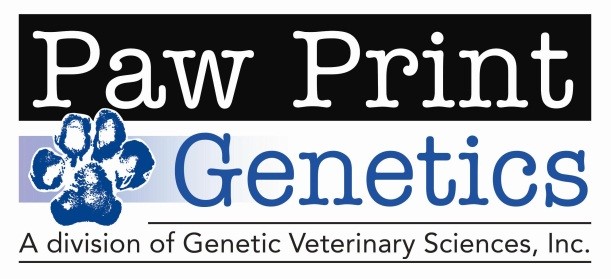
Currently, there is no regulatory oversight for canine genetic testing laboratories. Paw Print Genetics, a division of Genetic Veterinary Sciences, Inc., along with Feragen, a canine testing facility in Austria, has published a follow up to their Standards and Guidelines for Canine Clinical Genetic Testing Laboratories in the journal Human Genetics. This follow up publishes the first checklist that can be used by clinical testing laboratories that deliver genetic results to dog owners and breeders to provide self-assessment and develop a baseline for quality assurance. The checklist provides the first step toward a standardize quality assurance program within canine clinical genetic testing laboratories.
Paw Print Genetics collaborated with Feragen and others in the fall of 2018, to create and publish the first set of standards and guidelines for canine testing laboratories based on well-established standards and guidelines developed by the American College of Medical Genetics and Genomics and adopted by human genetic testing laboratories for many years. The purpose of the standards and guidelines is to provide guidance and uniformity across all canine genetic testing laboratories to improve accuracy throughout the whole industry.
Along with creating a checklist, this follow up publication also addresses concerns raised among the canine community that includes issues such as rare or private mutations, genetic screening using array-based technologies, non-peer reviewed tests, and the clinical validity of specific mutations in certain breeds.
“As a board-certified geneticist, I understand the need for standards and guidelines to help pave the way for industry uniformity and to increase accuracy in clinical testing,” says Lisa Shaffer, PhD Paw Print Genetics’ Founder and CEO, “because genetic testing in dogs is direct-to-consumer, we have an even higher burden of excellence in testing, as we deal directly with the dog owner and breeder who rely on testing to inform them in their breeding programs.”
The Publication states that following the Standards and Guidelines and using the checklist is, “the responsible approach to providing the consumer the best care for their dogs”.
Shaffer concludes, “The use of genetic testing in dogs is useful to the breeder who wishes to avoid producing puppies with diseases, provides tests for the veterinarian confirming a clinical diagnosis and allows selection of dogs for various important duties within our society such as service dogs, K-9 and military dogs. Tools like our recommended standards and guidelines combined with this new checklist can help to make sure that genetic test results are accurate and can be relied upon for these and other important decisions.”
Both the published Standards and Guidelines and the follow up checklist can be found in the journal Human Genetics though the links below:
Checklist: https://rdcu.be/bxgOn
Standards and Guidelines: https://link.springer.com/article/10.1007/s00439-018-1954-4
About Paw Print Genetics
Located in Spokane, Washington, Paw Print Genetics was founded in 2012 and is dedicated to raising the standard in canine genetic diagnostic testing, carrier screening, and customer support. Paw Print Genetics’ mission is to achieve optimal canine genetic health by providing outstanding resources for dog owners, breeders, trainers, and veterinarians for pets, show dogs and working dogs. For more information, visit https://www.pawprintgenetics.com/






















